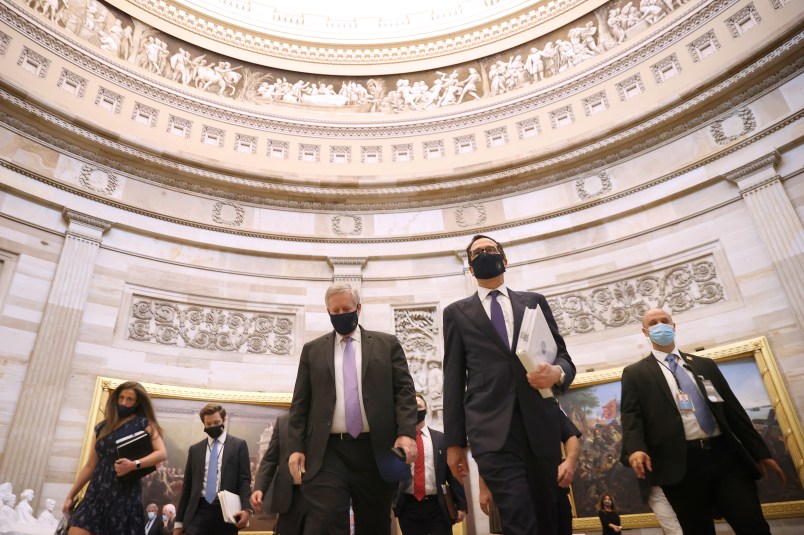As the four lead negotiators enter their seventh meeting Tuesday afternoon on COVID-19 relief measures, almost no progress has been made on the negotiation’s central tenet: the unemployment insurance benefit, a $600 a week safety net that officially expired for over 30 million Americans on Friday.
Democrats, led by House Speaker Nancy Pelosi (D-CA) and Senate Minority Leader Chuck Schumer (D-NY) have insisted that the benefit be extended for the foreseeable duration of the pandemic. Pelosi’s only concession so far has been a willingness to tie the benefit to the unemployment numbers, to decrease the weekly amount when the joblessness rate goes down.
Republicans, represented by Treasury Secretary Steve Mnuchin and White House Chief of Staff Mark Meadows in the meetings, have meanwhile struggled to coalesce behind a counter-position.
Meadows and Sen. Martha McSally (R-AZ) have proposed short-term extensions of the $600 per week benefit, but Pelosi shot them down. “Understand this, passing something for a week without all the other things that should go with it is not any path we will go down,” Pelosi said Friday on CNN. “It’s a public relations stunt on their part.”
Sen. Ron Johnson (R-WI) proposed a plan that would provide for a $200 a week allotment to each unemployment recipient until states implement a formula to calculate and recover 70 percent of the recipients’ lost wages. A group of senators including Mitt Romney (R-UT), Susan Collins (R-ME) and Martha McSally (R-AZ) offered a different version of the wage replacement plan, with a more gradual cutoff — it would allow states to either determine 80 percent wage replacement or decrease the flat benefit over time: $500 a week in August, $400 a week in September, and so on.
But there’s not yet widespread support in the caucus for either wage replacement plan.
“Many of our state departments of labor — they just got microwaves last week, much less being able to reprogram the computer in 60 days to effectuate a complicated formula,” Sen. John Kennedy (R-LA) told reporters last week. “Some of my colleagues are not either as crazy or candid as I am, and they’re not going to say anything, but I’m not the only one.”
None of the Republican proposals appears to have gained any traction with Democrats — or with a significant portion of the Republican caucus either. Senate Majority Leader Mitch McConnell (R-KY) has said that about 20 senators, suddenly balking at the deficit, don’t believe any more money should be spent. The sentiment has been echoed in the House, where some Republican members are taking a hard line on any amount of additional aid.
“Zero is the number for me,” Rep. Roger Williams (R-TX) told HuffPost of his preferred amount of federal aid. “I’m not sure that we should be adding to a state’s unemployment,” added Rep. Andy Biggs (R-AZ).
The Generosity Myth
Many Republicans have been parroting the argument that the $600/week benefit on top of state unemployment insurance is more than what some people were making before, and will disincentivize them to go back to work.
Because the $600 per week was calculated to be a rough average of the whole lot of unemployed people’s income, it’s true that some are making more than they were, and some less. That many people are getting more than they were is in no small part because the pandemic has taken the heaviest toll on industries replete with low-income jobs, like retail and hospitality.
But a study released June 27 by a group of Yale economists flies in the face of the second part of that argument — that $600 per week disincentivizes workers. The study found that the first round of unemployment insurance benefits did not reduce employment.
“The data do not show a relationship between benefit generosity and employment paths after the CARES Act, which could be due to the collapse of labor demand during the COVID-19 crisis,” Joseph Altonji, a co-author of the report, said.
“As to all this hand wringing that people are earning more unemployed than they were when working — which is not really true because they’re not getting fringe benefits — having the flat $600 is the best possible way to do stimulus because you’re giving money to people to spend right away into the economy,” Michele Evermore, senior analyst at the National Employment Law Program, told TPM. “And the lowest income people spend it right away.”
But the disarray on Capitol Hill is more than anecdotal — Senate Republicans have released a proposal for a plan called the HEALS Act to counter the Democrats’ HEROES Act — which passed the House in May and would have extended the $600 a week benefit until January — but haven’t mustered the votes to pass it.
President Donald Trump, for his part, has threatened to unleash a slew of ambiguous executive orders to somehow cut through the slog of negotiations. It’s not certain what form those orders would take to solve the problems: Trump has indicated his favor of using one to pause the federal payroll tax, but it’s unclear whether he has the power to do it.
For now, Pelosi, Schumer, Mnuchin and Meadows will meet again Tuesday afternoon to see which side will out-will the other. Pelosi, for one, doesn’t see any deal happening until next week.
“A building is on fire, and they are deciding how much water they want to have in the bucket,” she said Monday.



